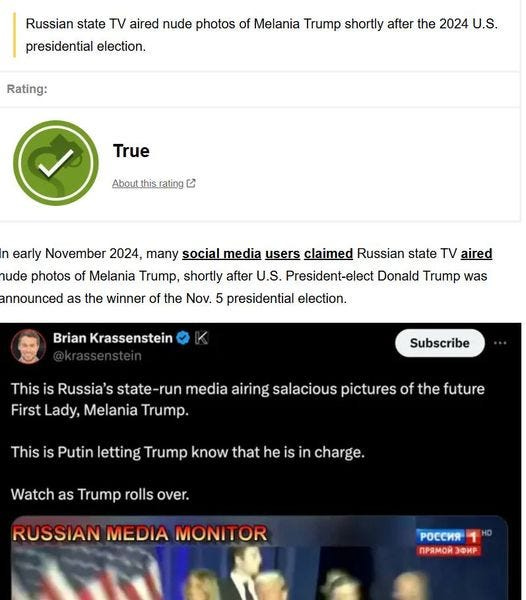Putin's Psychological Tactics and the Trump Relationship: Unveiling the Hidden Power of Kompromat
Could Putin’s calculated move signal a broader threat, hinting at the potential release of damaging material tied to Trump's personal life?
Newsletter: Information Warfare
A Veiled Threat or Political Leverage?
Unpacking Putin’s Alleged Threat to Trump:
The Power of Psychological Leverage
Recent actions by Russian state television, reportedly broadcasting images of Melania Trump, have ignited speculation over a potential veiled threat from Vladimir Putin directed at former U.S. President Donald Trump. The broadcast, if intentional, suggests a psychological tactic consistent with Russia’s use of kompromat—a long-standing strategy of leveraging compromising material to exert influence. In this instance, it’s possible that Putin is signaling his capability to deploy further damaging information if Trump’s actions diverge from Russia’s preferences, particularly regarding Ukraine.
Historical Context:
Russia’s Legacy of Kompromat
Kompromat has deep roots in Soviet and Russian intelligence, tracing back to the Cold War era. The KGB collected compromising information on diplomats, political figures, and business leaders worldwide, using it to shape foreign policy decisions or protect Soviet interests. Such cases often involved entrapping high-profile individuals in compromising scenarios, with the ensuing material becoming a form of leverage to align their actions with Soviet goals.
Notably, Putin himself was reportedly the target of similar tactics in 1999, when compromising footage threatened to derail his political ascent. This incident, whether true or not, likely reinforced his understanding of kompromat’s power. Today, Putin’s application of kompromat continues to shape his domestic control and influence international political figures.
Putin’s Psychological Warfare:
Media, Misinformation, and Threats
Throughout his leadership, Putin has weaponized state-controlled media to amplify misinformation and psychological tactics aimed at influencing both domestic and international audiences. Russia's interference in the 2016 U.S. presidential election serves as a recent example, using social media to stoke division and uncertainty in American society.
The alleged broadcast of images of Melania Trump could serve as a subtle form of psychological manipulation, signaling to Trump that personal vulnerabilities are exploitable. Russian intelligence is known for targeting family members or close associates of a political figure, leveraging these relationships to create indirect pressure. This method is rooted in Cold War tactics, where figures close to the target—spouses, children, or business associates—were subtly drawn into Russia’s psychological influence operations.
Asserting Dominance Over Trump:
Power Dynamics and a Veiled Threat
Putin’s calculated use of personal vulnerabilities as leverage with Trump may signal an effort to establish dominance within their relationship. By insinuating that he holds compromising material, Putin asserts psychological control, effectively warning that crossing specific boundaries on issues like NATO policy or U.S. involvement in Ukraine could trigger a more severe response. This behavior mirrors historical strategies seen in Soviet-aligned nations, where subtle threats maintained control without direct confrontation.
Putin might view Trump as a valuable figure who could influence key aspects of U.S. foreign policy, particularly concerning Russia’s strategic interests. Using psychological tactics, Putin aims to keep Trump from taking strong stances against Russian objectives.
The Steele Dossier and Kompromat’s Continued Influence
The broadcast recalls the Steele dossier’s infamous allegations of Russia possessing sensitive material on Trump, commonly referred to as the “pee tapes.” Although never substantiated, the dossier’s claims have loomed over Trump’s political image, suggesting a potential long-term Russian influence over his actions. If Putin’s recent actions imply a reminder of such leverage, it could signal a willingness to escalate to more damaging material if Trump opposes Russia’s geopolitical agenda.
Historically, Russian intelligence escalates kompromat gradually, beginning with less damaging material. By subtly reminding Trump of existing vulnerabilities, Putin may be reinforcing that further opposition to Russia’s policies could lead to more personal repercussions. This is consistent with Kremlin strategies to control influential figures, as seen in Soviet-era kompromat tactics designed to sustain pressure over time.
Implications for U.S.-Russia Relations
The alleged use of kompromat by Putin to maintain leverage over Trump highlights a deep-seated Russian strategy: using psychological manipulation to destabilize adversaries and shape foreign policy outcomes. If such tactics succeed in influencing high-profile figures, it could alter U.S. foreign policy, especially regarding NATO and Russian intervention in Eastern Europe. A weakened U.S. stance could embolden Putin’s actions, destabilizing the region and threatening global security.
The continued use of kompromat reflects the longstanding tensions in U.S.-Russia relations, where covert influence poses a significant challenge to transparent governance. With personal ties between American political figures and Russian counterparts under increasing scrutiny, the implications of these alleged tactics demand serious attention.
The Future of U.S.-Russia Relations and Global Stability
Putin’s alleged deployment of psychological tactics against Trump reflects a troubling trend in international politics. As a method of influence, kompromat remains potent, leveraging personal vulnerabilities to alter policy stances, and fostering distrust within government circles. This tactic has the potential to reshape not only U.S.-Russia relations but also the broader geopolitical landscape.
With transparency and vigilance, the U.S. must address these covert pressures that can quietly alter policy direction. In an increasingly interconnected and volatile world, understanding and countering these psychological strategies will be essential to maintaining stability and protecting democratic institutions.
References
“Trump's Private Talks With Putin May Have Put National Security at Risk,” The Washington Post, 2019.
“Analysis: Russia's Kompromat Strategy,” Foreign Affairs, 2023.
“The Cold War and the Legacy of Kompromat in Russian Intelligence,” Journal of Intelligence and National Security, 2021.
“Putin's PsyOps in International Relations,” The Economist, 2024.
“The Steele Dossier and the Allegations of Russian Influence on U.S. Politics,” BBC News, 2018.
“Kompromat and the Art of Psychological Warfare,” International Security Review, 2020.




